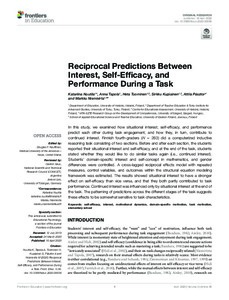| dc.contributor.author | Katariina Nuutila | |
| dc.contributor.author | Anna Tapola | |
| dc.contributor.author | Heta Tuominen | |
| dc.contributor.author | Markku Niemivirta | |
| dc.contributor.author | Sirkku Kupiainen | |
| dc.contributor.author | Attila Pásztor | |
| dc.date.accessioned | 2022-10-28T14:03:02Z | |
| dc.date.available | 2022-10-28T14:03:02Z | |
| dc.identifier.uri | https://www.utupub.fi/handle/10024/169053 | |
| dc.description.abstract | <p>In this study, we examined how situational interest, self-efficacy, and performance predict each other during task engagement, and how they, in turn, contribute to continued interest. Finnish fourth-graders (<i>N</i> = 263) did a computerized inductive reasoning task consisting of two sections. Before and after each section, the students reported their situational interest and self-efficacy, and at the end of the task, students stated whether they would like to do similar tasks again (i.e., continued interest). Students’ domain-specific interest and self-concept in mathematics, and gender differences were controlled. A cross-lagged reciprocal effects model with repeated measures, control variables, and outcomes within the structural equation modeling framework was estimated. The results showed situational interest to have a stronger effect on self-efficacy than vice versa, and that they both partly contributed to task performance. Continued interest was influenced only by situational interest at the end of the task. The patterning of predictions across the different stages of the task suggests these effects to be somewhat sensitive to task characteristics.<br /></p> | |
| dc.language.iso | en | |
| dc.publisher | Frontiers Media | |
| dc.title | Reciprocal Predictions Between Interest, Self-Efficacy, and Performance During a Task | |
| dc.identifier.url | https://doi.org/10.3389/feduc.2020.00036 | |
| dc.identifier.urn | URN:NBN:fi-fe2021042824837 | |
| dc.relation.volume | 5 | |
| dc.contributor.organization | fi=PÄÄT Turun ihmistieteiden tutkijakollegium (TIAS)|en=PÄÄT Turku Institute for Advanced Studies (TIAS)| | |
| dc.contributor.organization | fi=opettajankoulutuslaitos Turku|en=Dep. of Teacher Education Turku| | |
| dc.contributor.organization-code | 2604201 | |
| dc.contributor.organization-code | 2601230 | |
| dc.converis.publication-id | 46687226 | |
| dc.converis.url | https://research.utu.fi/converis/portal/Publication/46687226 | |
| dc.identifier.eissn | 2504-284X | |
| dc.identifier.jour-issn | 2504-284X | |
| dc.okm.affiliatedauthor | Tuominen, Heta | |
| dc.okm.discipline | 516 Educational sciences | en_GB |
| dc.okm.discipline | 516 Kasvatustieteet | fi_FI |
| dc.okm.internationalcopublication | international co-publication | |
| dc.okm.internationality | International publication | |
| dc.okm.type | Journal article | |
| dc.publisher.country | Switzerland | en_GB |
| dc.publisher.country | Sveitsi | fi_FI |
| dc.publisher.country-code | CH | |
| dc.relation.articlenumber | 36 | |
| dc.relation.doi | 10.3389/feduc.2020.00036 | |
| dc.relation.ispartofjournal | Frontiers in Education | |
| dc.year.issued | 2020 | |
